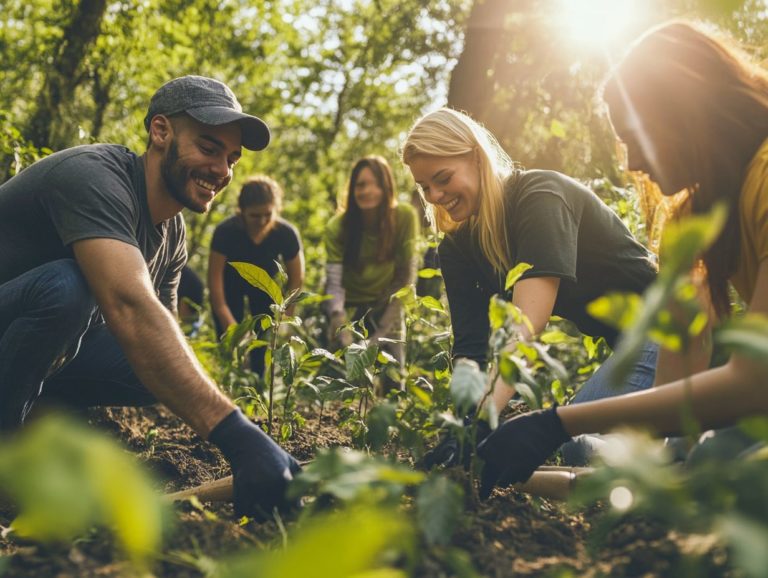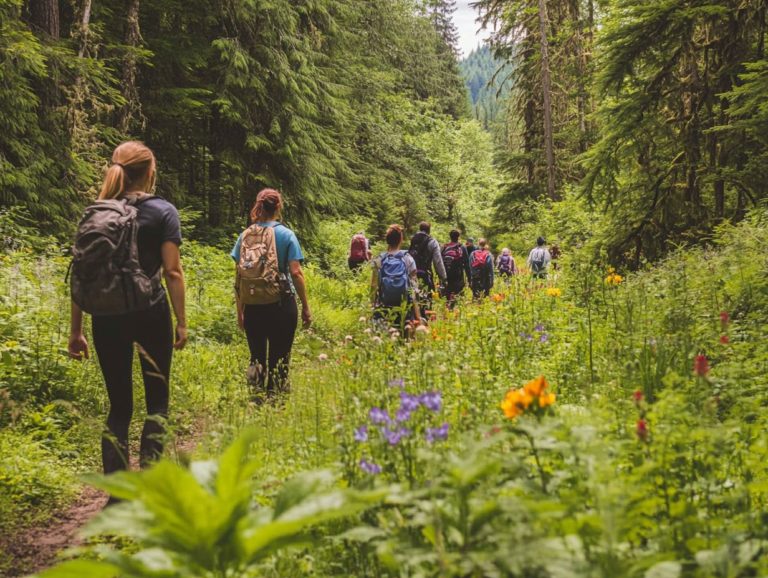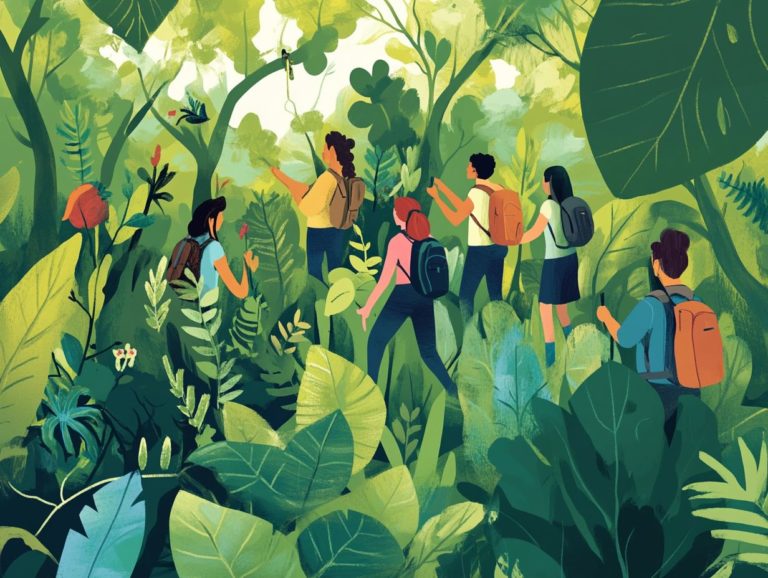How to Reduce Plastic Use When Traveling
Plastic pollution stands as one of the most pressing environmental challenges we face today, its effects rippling far beyond our immediate surroundings, highlighting the urgent need to reduce waste.
As travel becomes an essential part of our lives, the plastic waste generated during our adventures, particularly from single-use plastics, only exacerbates this global crisis.
This article delves into the consequences of plastic consumption, the obstacles encountered when attempting to minimize our plastic footprint, and offers practical tips for making eco-conscious decisions while traveling sustainably on the road.
Discover the advantages of reducing plastic waste during travels, and learn how to inspire others to join the movement toward a more sustainable future through education and collaboration.
Join us on this journey as we navigate these vital aspects of responsible travel, ensuring that your travel experience is both enjoyable and environmentally friendly.
Contents
- Key Takeaways:
- The Impact of Plastic on the Environment
- Challenges of Reducing Plastic Use While Traveling
- Ways to Reduce Plastic Use When Traveling
- Benefits of Reducing Plastic Use While Traveling
- How to Encourage Others to Reduce Plastic Use When Traveling
- Frequently Asked Questions
- 1. How can I reduce plastic use when traveling to places like Thailand or Kenya?
- 2. Are there eco-friendly alternatives to plastic bags while traveling, especially in urban areas like New York?
- 3. How can I avoid single-use plastic water bottles when traveling in eco-conscious cities like Denmark?
- 4. What can I do with my plastic waste while traveling?
- 5. How can I encourage sustainable practices while traveling, like Kristin Hostetter?
- 6. Can I make a difference by reducing my plastic use while traveling as part of a global movement?
Key Takeaways:
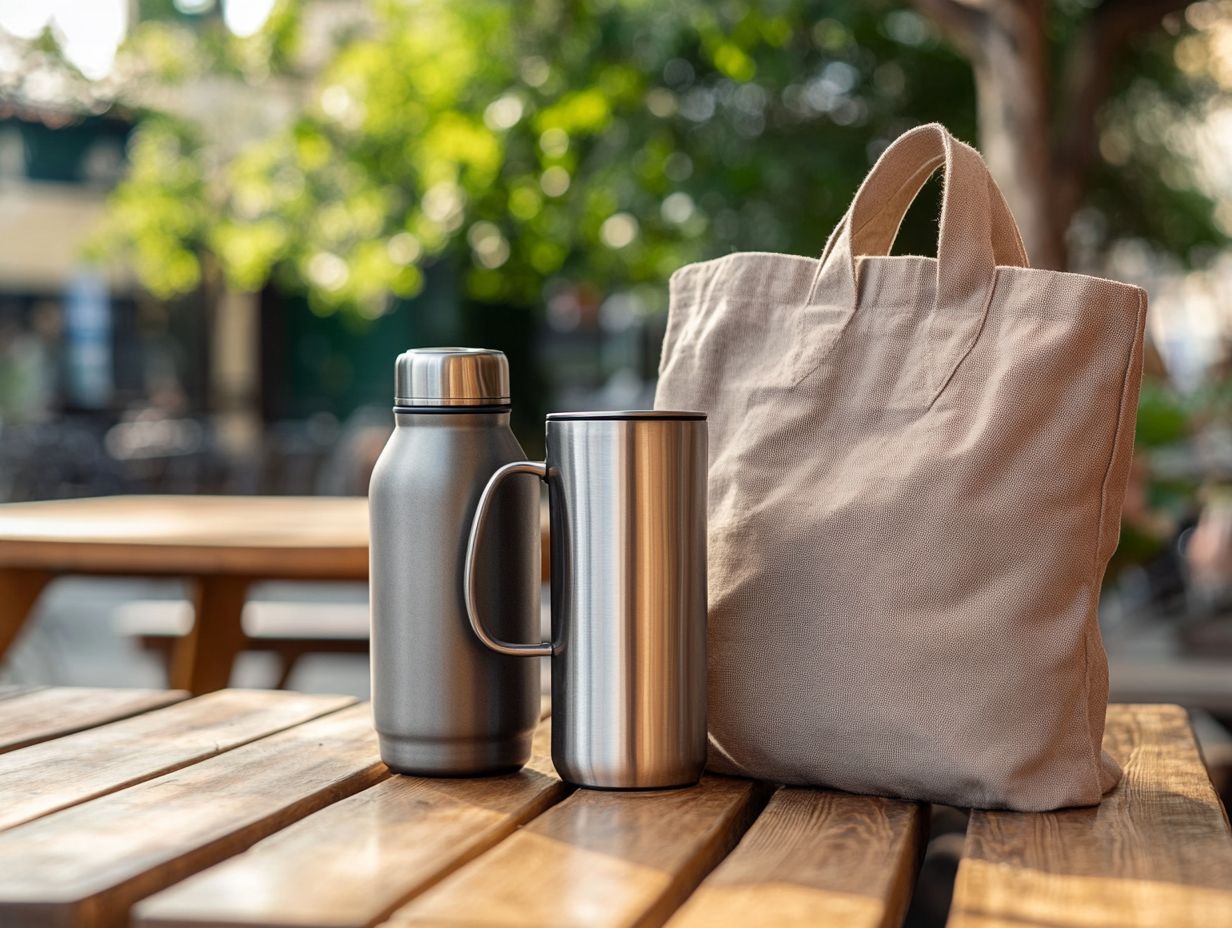
- You can make a big impact by reducing plastic use while traveling, even with small changes.
- Practical tips, such as bringing reusable items like a shopping bag and avoiding single-use plastics, can help reduce plastic use while traveling.
- Plastic pollution has a detrimental effect on the environment and its inhabitants.
The Impact of Plastic on the Environment
The impact of plastic on the environment is profound, affecting everything from local ecosystems to global climate patterns, including the health of marine ecosystems. Single-use plastics, particularly in food packaging, are major culprits in marine pollution, posing serious threats to wildlife and biodiversity the variety of plant and animal life in a particular habitat.
The United Nations Environment Programme (UNEP) highlights that plastic waste has evolved into a pressing global challenge that demands immediate action from governments, consumers, and industries alike. Organizations such as Travelers Against Plastic (TAP) are actively working to address this issue. Plastic pollution affects more than what we see as litter; it involves the degradation of natural habitats and the long-term health of our planet, impacting our efforts toward conservation and responsible travel.
Understanding the Consequences
Understanding the consequences of plastic consumption is essential for making informed decisions about sustainability, mindful travel, and responsible travel practices.
The widespread use of single-use plastics fills landfills and significantly hinders recycling efforts, leading to a relentless cycle of waste generation. These items frequently find their way into our oceans, wreaking havoc on marine ecosystems. Marine life can ingest or become entangled in plastic debris, threatening fish populations and disrupting the balance of entire ecosystems, resulting in long-term ecological damage.
To combat these alarming effects, embrace innovative solutions such as advocating for reusable alternatives like refillable water bottles, supporting bans on single-use plastics, and promoting community-level clean-up initiatives. These actions can play a crucial role in reducing the environmental impact of plastic consumption.
Challenges of Reducing Plastic Use While Traveling
Traveling offers a delightful blend of joy and adventure, but it also presents distinct challenges when it comes to reducing plastic use, especially with the prevalence of disposable items. Many travelers, in their quest for convenience, often lean on disposable and single-use plastics, which contribute to the global plastic pollution crisis.
This reliance amplifies plastic waste and undermines vital efforts toward ethical tourism and sustainable travel practices, making it crucial to pack wisely and consider our environmental impact. As we explore diverse destinations, we may encounter hurdles, including the availability of alternatives like reusable cutlery and cultural norms that favor plastic consumption. To address this, it’s beneficial to learn about eco-friendly alternatives to common travel products.
Take action now! On your next trip, consider the benefits of traveling with reusable items to reduce plastic use and contribute to a more sustainable future.
Common Obstacles and Solutions
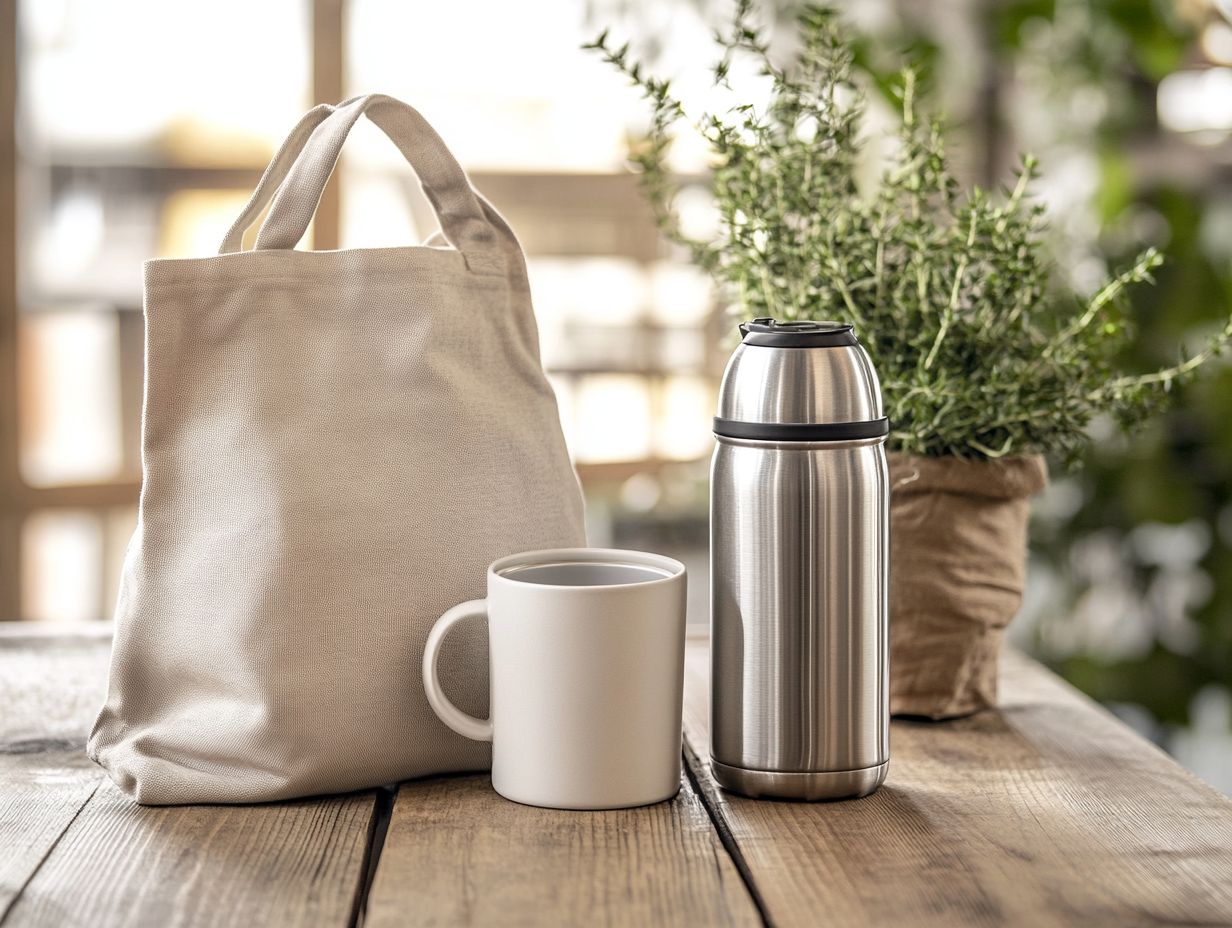
As you embark on your travels, you may encounter common obstacles that challenge your efforts to reduce plastic use. These include limited access to reusable items, such as shopping bags, and the overwhelming presence of single-use plastics in local markets.
Though these hurdles can diminish the joy of travel, addressing them can foster a commitment to sustainability among eco-minded travelers.
You might find yourself feeling frustrated, as your commitment to eco-friendly practices often feels at odds with the environment around you, where plastic packaging is abundant. Local stores may favor plastic packaging, which can be disheartening for travelers striving to travel responsibly, especially when awareness of sustainability is on the rise.
However, there are ways to make a positive impact through collaboration with local brands and participating in cleanups. By seeking out community-led initiatives and supporting local brands that prioritize sustainability, you can truly make a difference while promoting ethical tourism. Opting for market stalls that offer organic bags or glass containers not only helps reduce your plastic footprint but also supports the local economy and encourages sustainable food packaging.
Connect with eco-conscious locals and participate in cleanup events to transform your travel experience into a meaningful journey toward environmental responsibility while promoting conservation efforts.
Ways to Reduce Plastic Use When Traveling
Reducing plastic use while traveling is entirely within your reach by incorporating a few mindful practices and making eco-conscious choices. You can make a real difference by choosing reusable bags, refillable water bottles, and thermoses!
Embracing a zero-waste mentality gives you the power to significantly lessen your environmental impact and savor a more sustainable travel experience. By making intentional decisions regarding what to pack and how to shop, you can achieve a remarkable decrease in plastic consumption. Additionally, you can learn how to stay green while traveling abroad for an even more eco-conscious journey.
Practical Tips and Alternatives
Practical tips and alternatives for you as a traveler seeking to reduce plastic use include carrying reusable cutlery, a sustainable coffee cup, a menstrual cup for personal care, and opting for eco-friendly items that help ensure minimal waste during your journey.
Incorporating these eco-friendly items not only aids in cutting down on unnecessary plastic waste but also reflects your growing awareness of your environmental footprint, helping you travel responsibly. For instance, opting for a stainless steel or bamboo cutlery set can easily replace the plastic utensils typically handed out at takeout spots, while a collapsible coffee cup and reusable coffee cup eliminates the need for single-use cups that often find their way into landfills.
Using a menstrual cup can drastically reduce the waste generated from disposable sanitary products and aligns with a commitment to zero waste. Many eco-conscious travelers have shared their positive experiences, highlighting how small adjustments in packing can significantly contribute to sustainability efforts, encouraging others to embrace mindful travel.
Embracing these habits not only enhances your travel experience but also nurtures a sense of responsibility for preserving the stunning locations you explore while advocating for environmental conservation.
Benefits of Reducing Plastic Use While Traveling
Reducing plastic use while traveling presents a wealth of benefits not just for the planet but also for enriching your overall travel experience and fostering collaboration within communities focused on conservation, as well as promoting eco-tourism, which is travel that is focused on being environmentally friendly and supporting local communities.
This interconnected approach ensures that your travels are both delightful and responsible, paving the way for a more sustainable future, where education and community efforts play crucial roles.
Environmental and Personal Benefits
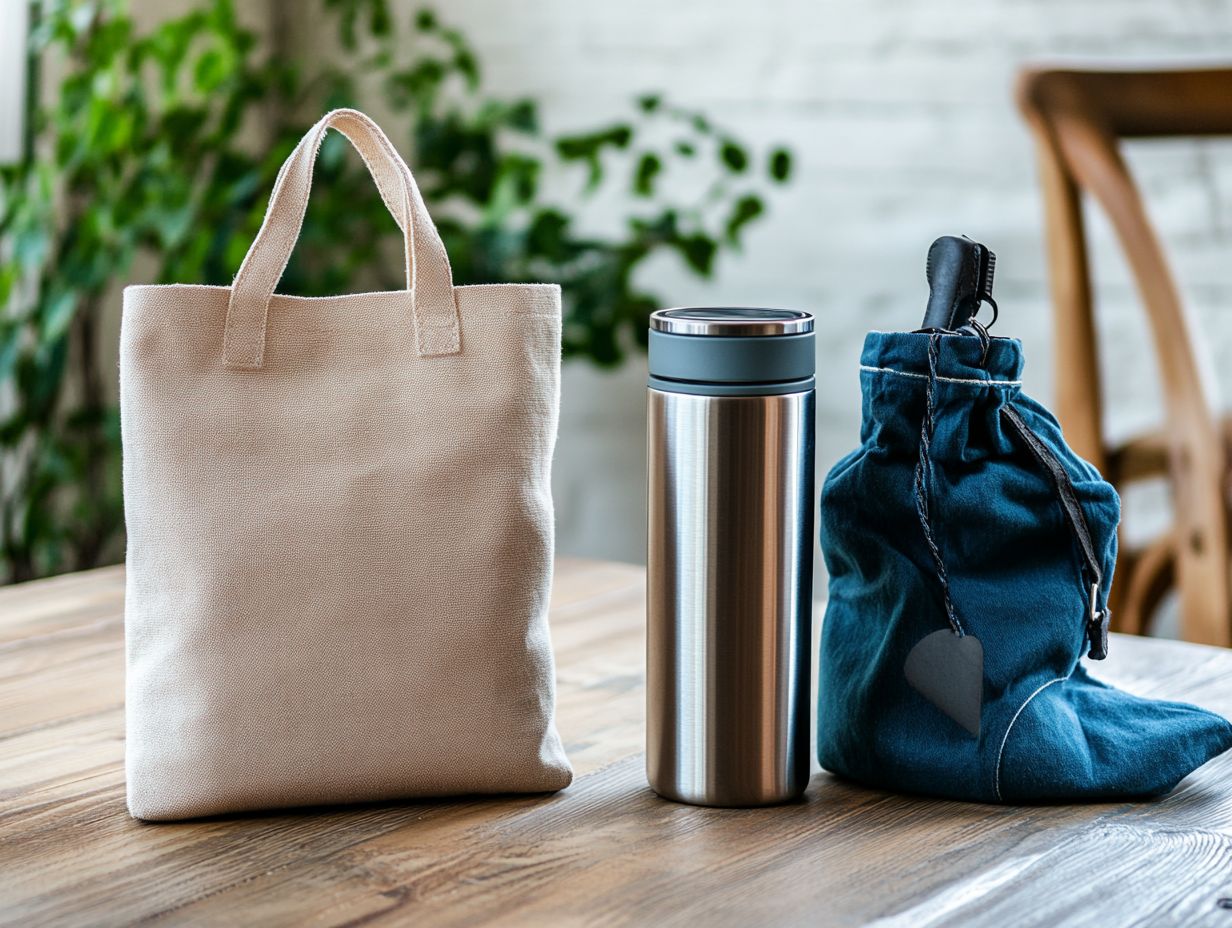
The environmental and personal benefits of reducing plastic use are profound. As your recycling efforts improve, you support cleaner oceans and help marine life stay healthy by committing to responsible practices.
Minimizing your plastic consumption actively contributes to cleaner oceans. This, in turn, allows ecosystems to thrive through collaborative efforts and community support. These conscious decisions lead to visible changes, such as vibrant coral reefs and thriving fish populations, which are essential for enhancing biodiversity and promoting conservation.
Engaging in sustainable travel opens up unique opportunities for personal growth. You foster a deeper connection with local cultures and communities that embrace eco-friendly travel. This experience opens your eyes to exciting environmental issues and inspires you to make more responsible choices in your daily life.
Ultimately, you can become an advocate for sustainability and promote travel tips that reduce plastic use.
How to Encourage Others to Reduce Plastic Use When Traveling
Encouraging others to minimize plastic use while traveling begins with fostering awareness. Champion change through education and community collaboration, especially through local initiatives. This approach highlights the powerful collective impact travelers can have in the fight against plastic pollution.
By sharing insights on the environmental repercussions of plastic and introducing sustainable practices, you can inspire friends, family, and fellow travelers to embrace eco-friendly choices. Encourage participation in local cleanup efforts to foster a culture of sustainability. Your actions can spark a ripple effect, transforming travel into a force for good.
Spreading Awareness and Promoting Change
Spreading awareness and driving change is a collective endeavor. Education is crucial in nurturing a culture of ethical tourism and sustainability, empowering eco-minded travelers.
When communities unite, they can amplify their message about reducing plastic use while traveling. This benefits both the environment and local economies through collaboration. Collaborative initiatives can include education workshops and community cleanups, along with packing tips for sustainable travel.
- Join workshops led by experts to learn about sustainability practices.
- Partner with local businesses that promote zero-waste options.
- Participate in awareness campaigns that use social media to connect with a broader audience and promote eco-tourism initiatives.
To take actionable steps in your sustainability journey, you can start by:
- You can share informative resources on sustainable travel practices.
- You can organize local clean-up events with initiatives like Travelers Against Plastic (TAP).
- You can encourage friends and family to choose eco-friendly alternatives, such as H&M and Lush.
Supporting local artisans who create sustainable products can also make a meaningful difference in the fight against plastic pollution. Collaborations with organizations like SEE Turtles can enhance these efforts.
Frequently Asked Questions
1. How can I reduce plastic use when traveling to places like Thailand or Kenya?
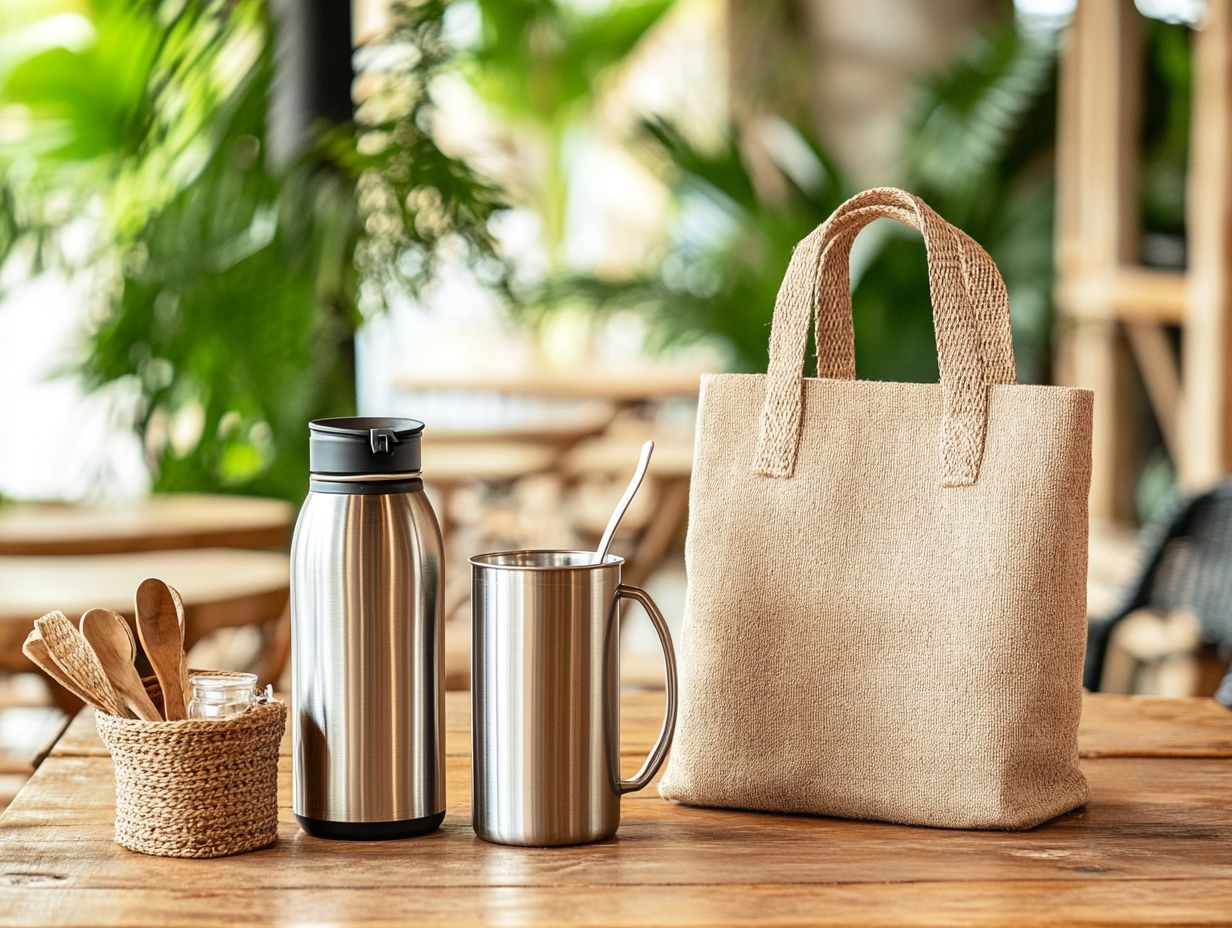
There are several ways to reduce plastic use when traveling. Start by bringing your own reusable water bottle, utensils, and containers for food. Opt for eco-friendly toiletries and avoid buying single-use plastic items, such as straws and plastic bags.
Take your first step today!
2. Are there eco-friendly alternatives to plastic bags while traveling, especially in urban areas like New York?
Yes! There are many eco-friendly alternatives. Use reusable cloth bags or bring your own foldable bags.
Check out local shops in Salt Lake City for great options. You can also ask for paper bags at stores or refuse a bag if you don t need one.
3. How can I avoid single-use plastic water bottles when traveling in eco-conscious cities like Denmark?
Bring your own reusable water bottle, like the Life Straw. Refill it at water fountains or ask restaurants to fill it for you.
Consider investing in a water filter bottle. This type of bottle cleans water from any source, making it safe to drink.
4. What can I do with my plastic waste while traveling?
Make sure to dispose of plastic waste properly. Look for recycling bins or ask locals where you can recycle.
If recycling isn t an option, try to reuse it or take it back home to recycle.
5. How can I encourage sustainable practices while traveling, like Kristin Hostetter?
Take action now! Show others how easy it is to reduce plastic use.
Support initiatives like Travelers Against Plastic and spotlight local businesses that prioritize sustainability. Share your experiences on social media to spread awareness!
6. Can I make a difference by reducing my plastic use while traveling as part of a global movement?
Absolutely! Every small action adds up and helps create a cleaner, healthier planet.
You can inspire others to join you. Together, we can create a powerful global movement for sustainability!


